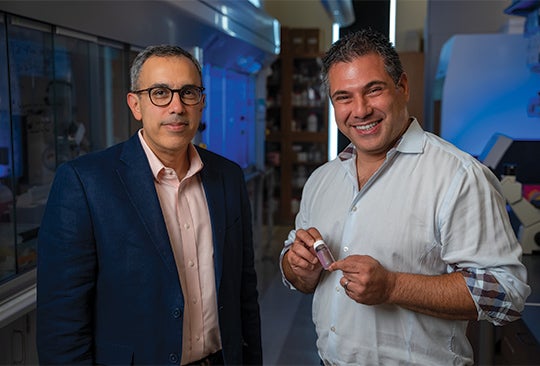A Thor’s Hammer
Rice’s new immunotherapy implant aims to reduce U.S. cancer deaths.

Winter 2024 | By Jade Boyd
The Advanced Research Projects Agency for Health, a new agency within the National Institutes of Health, has awarded a Rice-led team $45 million to rapidly develop implant technology that Rice bioengineer and principal investigator Omid Veiseh says is aimed to slash U.S. cancer-related deaths by more than 50%.
The award will fast-track development and testing of a new approach to cancer treatment that aims to dramatically improve immunotherapy outcomes for patients with ovarian, pancreatic and other difficult-to-treat cancers.
“Instead of tethering patients to hospital beds, IV bags and external monitors, we’ll use a minimally invasive procedure to implant a small device that continuously monitors their cancer and adjusts their immunotherapy dose in real time,” Veiseh says. “This kind of ‘closed-loop therapy’ has been used for managing diabetes, where you have a glucose monitor that continuously talks to an insulin pump. But for cancer immunotherapy, it’s revolutionary.”
The team includes engineers, physicians and multidisciplinary specialists in synthetic biology, materials science, immunology, oncology, electrical engineering, artificial intelligence and other fields spanning 20 different research labs across seven states.
The project and team are named THOR, an acronym for “targeted hybrid oncotherapeutic regulation,” and the implant is called HAMMR, or “hybrid advanced molecular manufacturing regulator.”
Amir Jazaeri, a principal investigator and director of the gynecologic cancer immunotherapy program at MD Anderson Cancer Center, explains, “Cancer cells are continually evolving and adapting to therapy. However, currently available diagnostic tools, including radiologic tests, blood assays and biopsies, provide very infrequent and limited snapshots of this dynamic process. As a result, today’s therapies treat cancer as if it were a static disease. We believe THOR could transform the status quo by providing real-time data from the tumor environment that can in turn guide more effective and tumor-informed novel therapies.”
Jazaeri says that the implant is designed to provide a complex assessment of cancer cells, including the hormones they produce and the way they change over time.
“The first clinical trial will focus on refractory recurrent ovarian cancer, and the benefit of that is that we have an ongoing trial for ovarian cancer with our encapsulated cytokine ‘drug factory’ technology. We’ll be able to build on that experience,” Veiseh says. He adds that with the funding award from the federal government, the team hopes to bring the solution to patients in as little as five years — a highly accelerated timeline.
President Reginald DesRoches says, “Rice is proud to be the recipient of the second major funding award from the Advanced Research Projects Agency for Health. This is the type of research that makes a significant impact on the world.”
Omid Veiseh is associate professor of bioengineering at Rice’s George R. Brown School of Engineering. He is also a Cancer Prevention and Research Institute of Texas scholar in cancer research.
